
The Movement of Society for Peace, sometimes known by its shortened form Hamas, is a Sunni Islamist party in Algeria, led by Mahfoud Nahnah until his death in 2003. Its current leader is Abderrazak Makri. It is an offshoot of the Muslim Brotherhood.

Student activism or campus activism is work by students to cause political, environmental, economic, or social change. In addition to education, student groups often play central roles in democratization and winning civil rights.
Liberalism in Egypt or Egyptian liberalism is a political ideology that traces its beginnings to the 19th century.

The Muslim Brotherhood of Syria is a Syrian branch of the Sunni Islamist Muslim Brotherhood organization. Its objective is the transformation of Syria into an Islamic state governed by Sharia law through a gradual legal and political process.
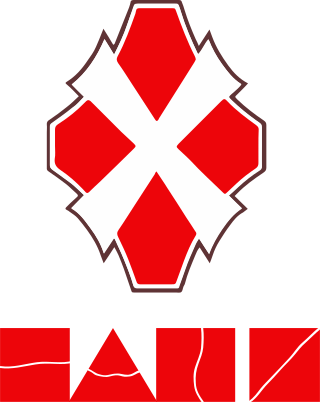
Nashi was a political youth movement in Russia, which declared itself to be a democratic, anti-fascist, anti-"oligarchic-capitalist" movement. Nashi was widely characterized as a pro-Putin outfit, with the Bureau of Investigative Journalism describing it as "Putin's private army". Western critics have detected a "deliberately cultivated resemblance to" the Soviet Komsomol or to the Hitler Youth and dubbed the group "Putinjugend".
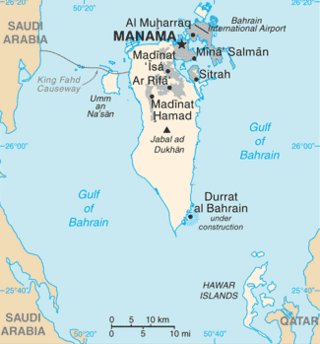
The 1990s uprising in Bahrain also known as the uprising of dignity was an uprising in Bahrain between 1994 and 1999 in which leftists, liberals and Islamists joined forces to demand democratic reforms. The uprising caused approximately forty deaths and ended after Hamad bin Isa Al Khalifa became the Emir of Bahrain in 1999 and a referendum on 14–15 February 2001 massively supported the National Action Charter. The uprising resulted in the deaths of around 40 civilians and at least one Bahraini soldier.
In the 2000s in Bahrain the government instituted political reforms and relaxed economic controls.

Mauritania, officially the Islamic Republic of Mauritania, is a sovereign country in Northwest Africa. It is bordered by the Atlantic Ocean to the west, Western Sahara to the north and northwest, Algeria to the northeast, Mali to the east and southeast, and Senegal to the southwest. By land area, Mauritania is the 11th-largest country in Africa and the 28th-largest in the world, and 90% of its territory is situated in the Sahara. Most of its population of approximately 4.3 million lives in the temperate south of the country, with roughly one-third concentrated in the capital and largest city, Nouakchott, located on the Atlantic coast.
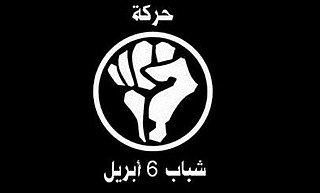
The April 6 Youth Movement is an Egyptian activist group established in Spring 2008 to support the workers in El-Mahalla El-Kubra, an industrial town, who were planning to strike on 6 April.

The 2011 Egyptian revolution, also known as the 25 January Revolution, began on 25 January 2011 and spread across Egypt. The date was set by various youth groups to coincide with the annual Egyptian "Police holiday" as a statement against increasing police brutality during the last few years of Hosni Mubarak's presidency. It consisted of demonstrations, marches, occupations of plazas, non-violent civil resistance, acts of civil disobedience and strikes. Millions of protesters from a range of socio-economic and religious backgrounds demanded the overthrow of Egyptian President Hosni Mubarak. Violent clashes between security forces and protesters resulted in at least 846 people killed and over 6,000 injured. Protesters retaliated by burning over 90 police stations across the country.
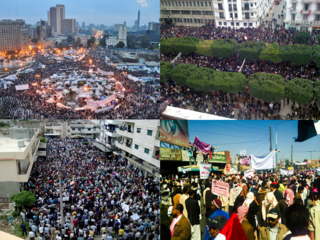
The Arab Spring or the First Arab Spring was a series of anti-government protests, uprisings and armed rebellions that spread across much of the Arab world in the early 2010s. It began in Tunisia in response to corruption and economic stagnation. From Tunisia, the protests then spread to five other countries: Libya, Egypt, Yemen, Syria and Bahrain. Rulers were deposed or major uprisings and social violence occurred including riots, civil wars, or insurgencies. Sustained street demonstrations took place in Morocco, Iraq, Algeria, Lebanon, Jordan, Kuwait, Oman and Sudan. Minor protests took place in Djibouti, Mauritania, Palestine, Saudi Arabia and the Moroccan-occupied Western Sahara. A major slogan of the demonstrators in the Arab world is ash-shaʻb yurīd isqāṭ an-niẓām!.

The impact of the Arab Spring concerns protests or by the way attempts to organize growing protest movements that were inspired by or similar to the Arab Spring in the Arab-majority states of North Africa and the Middle East, according to commentators, organisers, and critics. These demonstrations and protest efforts have all been critical of the government in their respective countries, though they have ranged from calls for the incumbent government to make certain policy changes to attempts to bring down the current political system in its entirety. In some countries, protests have become large or widespread enough to effect change at the national level, as in Armenia, while in others, such as Djibouti, were swiftly suppressed.

The Syrian National Council, sometimes known as the Syrian National Transitional Council or the National Council of Syria, is a Syrian opposition coalition, based in Istanbul, Turkey, formed in August 2011 during the Syrian civil uprising against the government of Bashar al-Assad.

The Arab Socialist Ba'ath Party, also referred to as the pro-Iraqi Ba'ath movement, is a neo-Ba'athist political party which was headquartered in Baghdad, Iraq, until 2003. It is one of two parties which emerged from the 1966 split of the original Ba'ath Party.
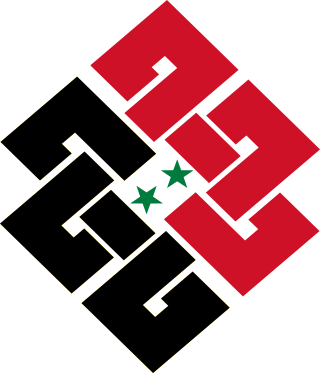
The National Coordination Committee for Democratic Change (NCC), or National Coordination Body for Democratic Change (NCB), is a Syrian bloc chaired by Hassan Abdel Azim consisting of 13 left-wing political parties and "independent political and youth activists". It has been defined by Reuters as the internal opposition's main umbrella group. The NCC initially had several Kurdish political parties as members, but all except for the Democratic Union Party left in October 2011 to join the Kurdish National Council. Some opposition activists have accused the NCC of being a "front organization" for Bashar al-Assad's government and some of its members of being ex-government insiders.

The Syrian opposition is the political structure represented by the Syrian National Coalition and associated Syrian anti-Assad groups with certain territorial control as an alternative Syrian government.
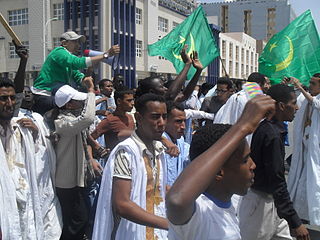
The 2011–2012 Mauritanian protests were a series of protests in Mauritania that started in January 2011, influenced by and concurrent with the Arab Spring, and continued into 2012. The mostly peaceful protest movement demanded that President Mohamed Ould Abdel Aziz institute political, economic, and legal reforms. Common themes of protest centered around civil-military relations, slavery, other human rights abuses the opposition accused the government of perpetrating, and economic issues. The protests began after the self-immolation of Mohamed Bouazizi and continued in what would come to be known as the February 25th Movement. Other protests, such as those against the census and student movements calling for Aziz's resignation, continued throughout 2011 and into 2012. As in other countries impacted by the Arab Spring, protestors used social media to coordinate and publicize demonstrations. The reaction of Mauritanian authorities to these protests varied, oscillating between explicit approval, ambivalence, and violent repression.

Abdulwahab Hussain Ali Ahmed Esmael is a Bahraini political activist, writer, religious figure and philosopher. He was one of the most prominent opposition leaders in the 1990s uprising when he was arrested twice for a total length of five years in which he was allegedly subjected to solitary confinement and torture. After his release in 2001, he supported government reform plans.
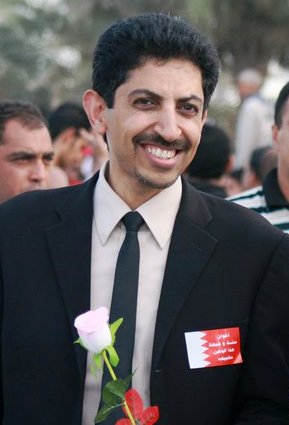
The Bahrain Thirteen are thirteen Bahraini opposition leaders, rights activists, bloggers and Shia clerics arrested between 17 March and 9 April 2011 in connection with their role in the national uprising. In June 2011, they were tried by a special military court, the National Safety Court, and convicted of "setting up terror groups to topple the royal regime and change the constitution"; they received sentences ranging from two years to life in prison. A military appeal court upheld the sentences in September. The trial was "one of the most prominent" before the National Safety Court. A retrial in a civilian court was held in April 2012 but the accused were not released from prison. The sentences were upheld again on 4 September 2012. On 7 January 2013, the defendants lost their last chance of appeal when the Court of Cassation, Bahrain's top court upheld the sentences.

Women played a variety of roles in the Arab Spring, but its impact on women and their rights is unclear. The Arab Spring was a series of demonstrations, protests, and civil wars against authoritarian regimes that started in Tunisia and spread to much of the Arab world. The leaders of Tunisia, Egypt, Libya, and Yemen were overthrown; Bahrain has experienced sustained civil disorder, and the protests in Syria have become a civil war. Other Arab countries experienced protests as well.
















